Novice K9 Handler Skips Her Dog's Funeral For Cosmetics Appointment, Now Puzzled By Instructor's Anger
Beginning a new job can often feel like being tossed into the deep end. The climb from the bottom to where you want to be can be steep and full of surprises.
However, some individuals yearn to bypass the learning curve, desiring to arrive at their dream role despite being less experienced or knowledgeable. This can cause discord, as it did for our protagonist.
Our heroine (26f) found herself in the midst of such a dilemma during her tenure at a K9 department. She aspired to specialize in either explosives or narcotics detection when she started six months prior.
However, due to a lack of available positions, she was placed in cadaver detection, partnered with an eight-year-old Belgian Malinois. This pup, despite his years, had an unruly temperament, always causing a ruckus and running away with his ball after training sessions.
The dog was diagnosed with a terminal condition after six months and, unfortunately, had to be put to sleep. Despite being the current handler, OP didn't attend his farewell ceremony or funeral.
Why? Because these events weren't part of her duties; she had a HydraFacial appointment at a clinic. This led to a terse phone call with her instructor, who was unhappy about OP's absence at the dog's farewell.
When OP pointed out that there was no legal obligation to attend, the instructor threatened to report her. OP's retort was simple—go ahead. The dog had been with her for only six months, and she didn't know much about his history at the department.
She did have concerns about her job, though. She watched her explosive section colleagues visiting VIP locations while narcotics handlers went on challenging missions with high accolades.
She, however, was stuck working with a team of grumpy seniors, searching for corpses during freezing nights and ending up dirty after every mission.
OP is working six months at the K9 department, placed in cadaver detection with an unruly Belgian Malinois, and struggles to control him
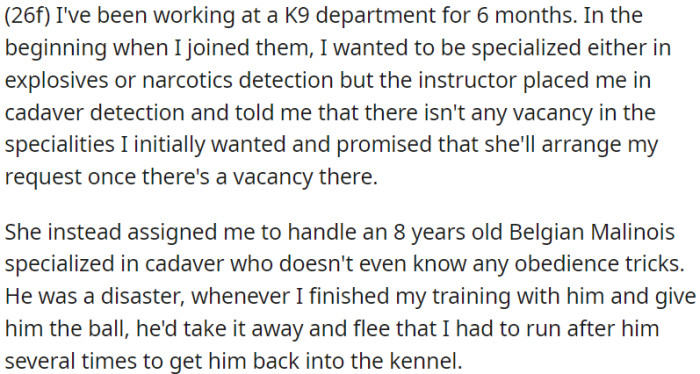
Dog was diagnosed with a terminal condition, euthanized. OP missed the ceremony, had a clinic appointment. The instructor was angry, reported OP, and an argument ensued.
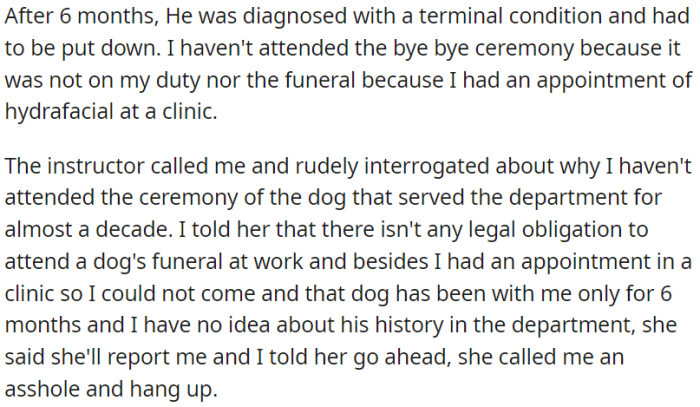
OP feels unfairly treated and experiences unnecessary guilt over a dog's funeral.
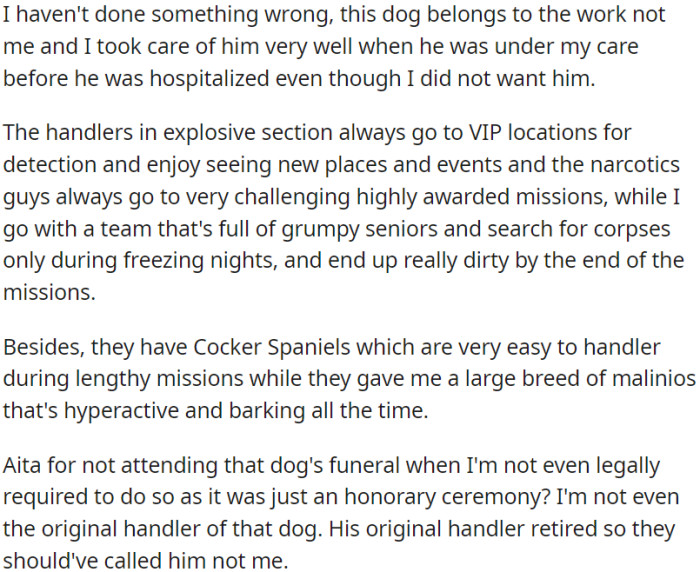
Exploring Attachment and Responsibility
Attachment theory, developed by John Bowlby, suggests that our early relationships shape how we view responsibility and emotional bonds.
In this case, the novice K9 handler's dismissive attitude toward her dog's funeral may stem from an insecure attachment style, which can lead to difficulties in forming emotional connections.
Research indicates that individuals with insecure attachments often struggle to prioritize relationships over personal interests.
Due to burnout and frustration in her current job, OP seeks a transfer to the K9 unit and plans to request a transfer to the K9 bomb sniffing section in the future.
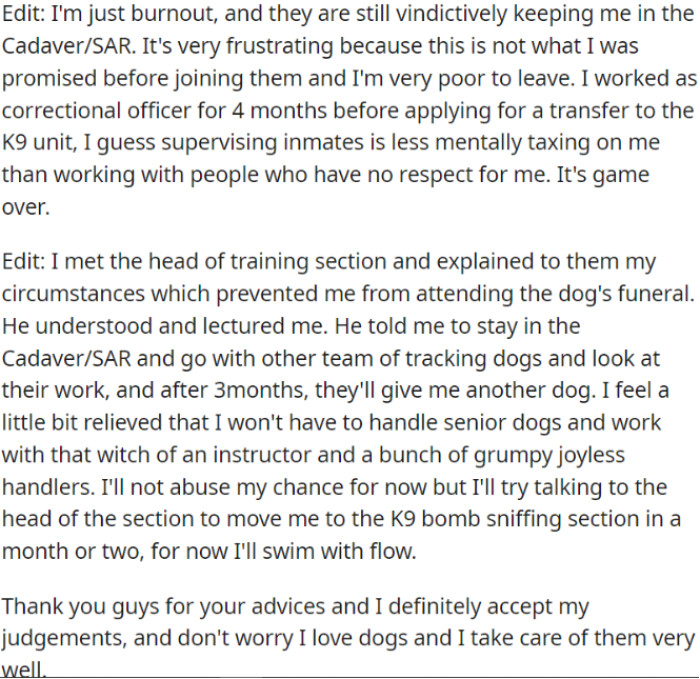
OP's career fate is up to her

Sounds like OP hates her job
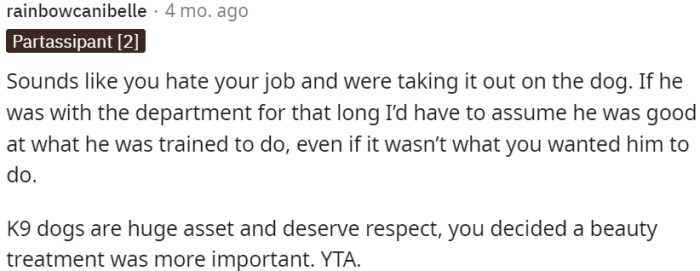
Moreover, the concept of cognitive dissonance plays a significant role in her puzzlement over the instructor's anger.
When individuals hold conflicting beliefs—such as viewing a work dog merely as a job versus a companion—they may experience confusion and defensiveness when challenged.
This internal conflict can hinder emotional processing and lead to a lack of empathy for others' feelings.
OP shows a lack of commitment to the job and team
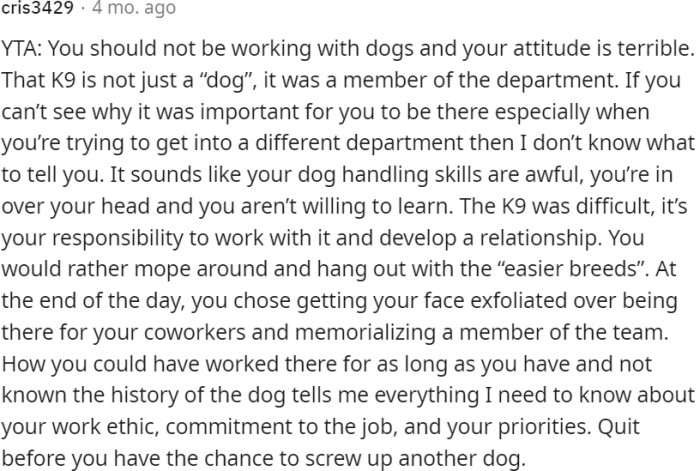
OP should show dedication to her fellow officers and their service
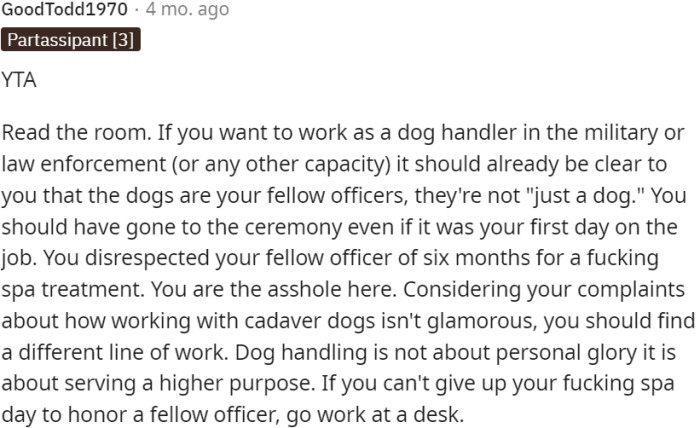
The dog is also a partner

The Importance of Emotional Intelligence
Emotional intelligence (EI) is crucial for navigating complex interpersonal relationships.
Research by Daniel Goleman emphasizes that high EI enables individuals to recognize and manage their own emotions while empathizing with others.
In this scenario, enhancing EI could allow the handler to better understand the impact of her choices on those around her.
OP should find a different job and not work with dogs
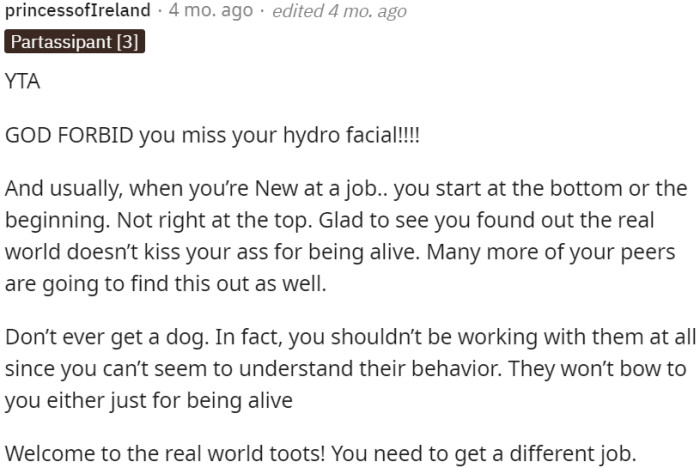
OP is criticized for not attending the event after working with the dog for six months
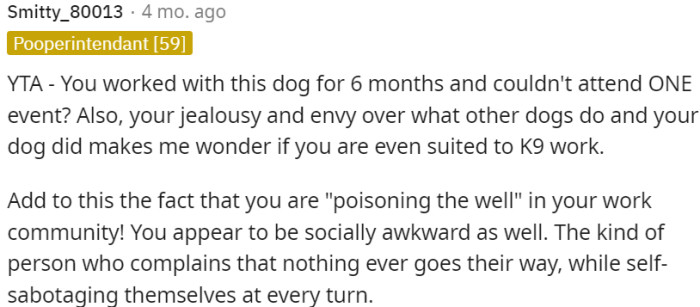
OP's actions are seen as disrespectful and may affect her future career prospects
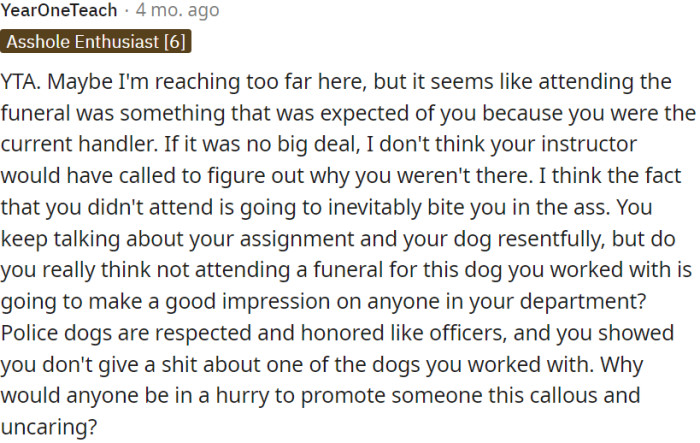
Experts recommend developing emotional intelligence through active listening and self-reflection exercises.
Engaging in regular feedback sessions with peers can also help individuals recognize how their actions affect others, promoting greater empathy and responsibility.
Additionally, practicing gratitude can enhance one’s ability to appreciate relationships, leading to more meaningful connections.
It's essential for OP to keep talking openly with her bosses about how she feels, what she wants to achieve, and any issues that bother her. She should stand up for herself and find a workplace that appreciates her skills and talents.
OP's mental well-being and job satisfaction matter greatly, and if things don't improve, she shouldn't be afraid to explore other opportunities.
Understanding Grief in the Context of Work
Workplace grief can often be overlooked, especially when it involves animals.
Studies show that the loss of a working dog can evoke profound feelings of grief akin to losing a human companion, yet many individuals struggle to articulate this pain.
Recognizing this can foster a culture of support within work environments, encouraging open discussions about grief and loss.
Psychological Analysis
This situation illustrates how emotional detachment can arise in professional contexts, particularly when individuals struggle to reconcile their personal feelings with their roles.
Encouraging emotional awareness and understanding the significance of relationships can pave the way for healthier responses in similar scenarios.
Analysis generated by AI
Analysis & Alternative Approaches
Understanding the psychological factors at play in this situation can lead to more compassionate interactions.
Research consistently highlights the importance of emotional intelligence and empathy in fostering healthier relationships, especially in high-stress environments.
Ultimately, enhancing these skills can lead to a richer emotional life and better interpersonal connections.



